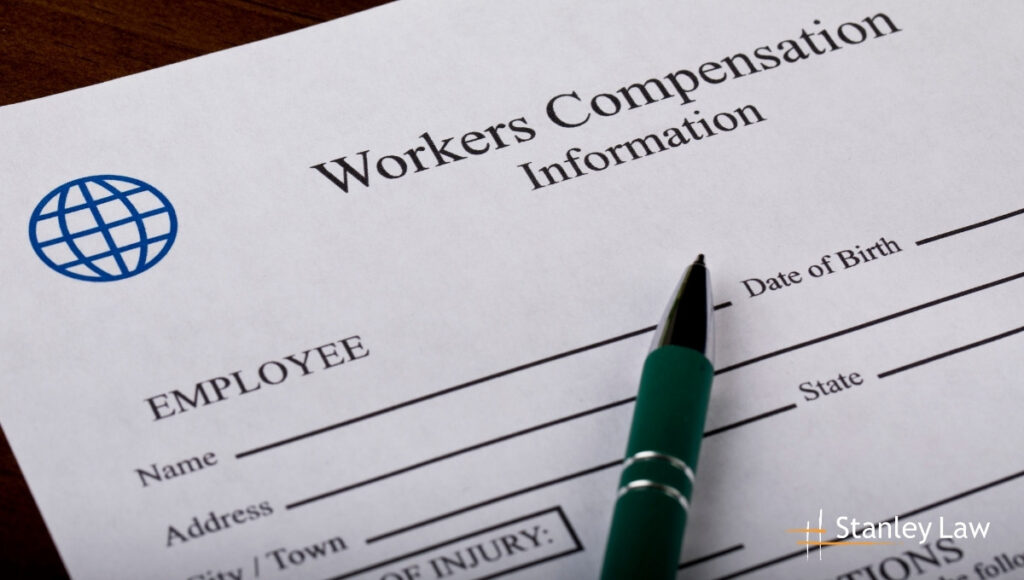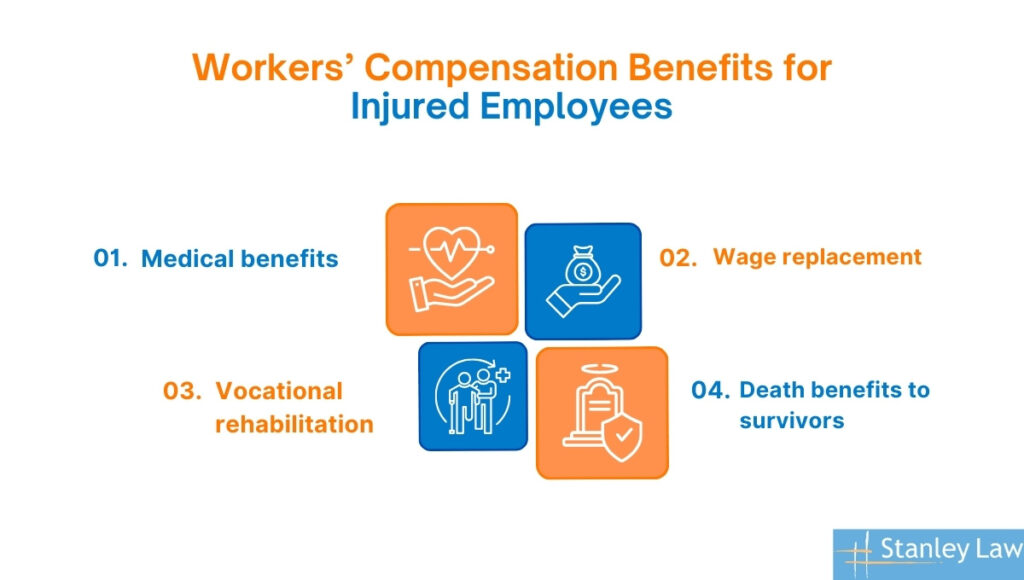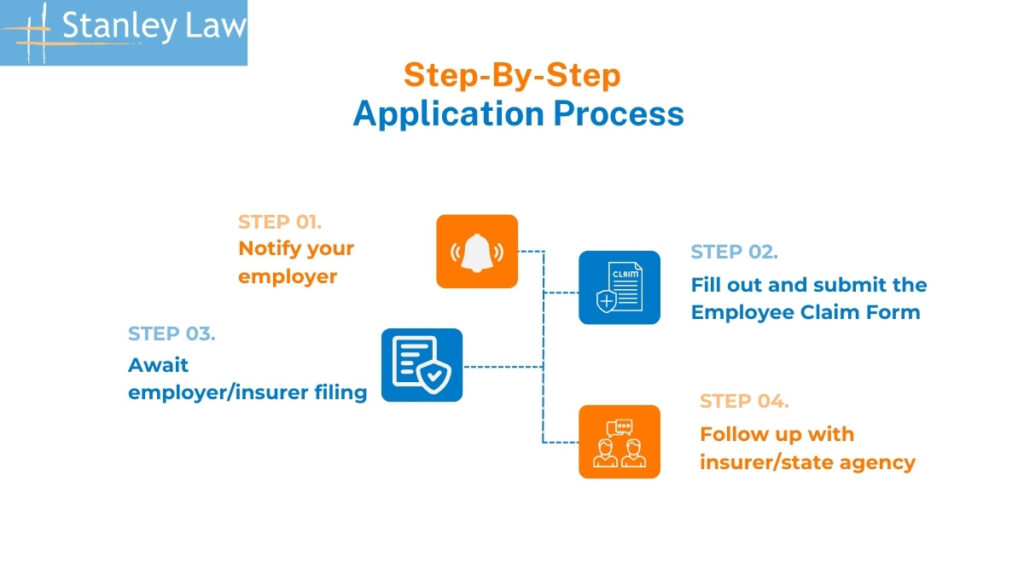What is Workers’ Compensation? Workers’ Compensation is an insurance program that employers fund to cover injured workers’ medical bills and lost wages. It operates under a no-fault rule, so employees do not need to prove who caused the injury.
For instance, if you suffer a back injury while lifting boxes or slip on a wet floor, the New York Workers’ Compensation program helps cover your medical bills and lost wages, without needing to prove anyone was at fault.
It is a state-administered program designed to facilitate quick and timely support for employees of New York businesses, so that they can focus primarily on healing instead of encountering headaches fighting legal battles. Most employees qualify for Workers’ Compensation as long as the injury happened while in the normal course of their job.
If your claim is denied or delayed, Stanley Law Offices can help you understand your rights and take action.
Why Workers’ Compensation Exists
Workers’ Compensation laws were created to provide victims fast, fair access to help in lieu of long, costly, multi-step lawsuits. Before these laws were enacted, injured employees had to sue their employers to get medical care or wage support. Legal cases could take months or years, delaying recovery. This system protects both workers and employers: employees receive quick medical and financial support, and in return employers reduce their legal risk by maintaining insurance coverage.
Fault does not matter; what matters only is that the injury happened while the employee was on the clock conducting work for their employer. This no-fault structure speeds up the workers comp process, lowers legal costs, and reduces arguments and conflict. Workers’ Compensation exists to create a balanced, efficient way to support injured workers expediently while limiting disputes and delays.
How Workers’ Compensation Functions
Here is how the process of workers’ comp works in New York, who pays for it, and why proving fault is not required to get the help you need.
Overview of the Workers’ Comp Process
The Workers’ Compensation process starts when an injury is reported at work. The employer then files a claim with their insurance provider. The insurer reviews details, verifies medical reports, and decides on benefits.
Key workers’ compensation benefits include medical treatment and wage replacement. If approved, payments begin quickly. If denied, workers can make a formal appeal through the state’s Workers’ Comp board.
State agencies oversee the process to ensure fairness. Employees must report injuries promptly, follow medical advice, and submit required forms. Employers must cooperate fully and maintain coverage.
Timely reporting and accurate documentation are critical for fast approval and steady support during recovery.
Who Pays for Workers’ Compensation?
Employers pay the full cost of workers’ compensation through their business insurance. Most businesses choose between two options:
- Workers’ Compensation State Fund: Government-run insurance for high-risk employers or those without private options.
- Private Insurance Company: State-approved insurers that set premiums based on job risk and claim history.
How the No-fault System Works
You do not need to prove your employer caused the injury to get benefits. If the injury happened while performing your job, you qualify. This no-fault system speeds up claims and avoids disputes.
Some exceptions apply, such as off-duty injuries or fraud.

Who is Covered by Workers’ Compensation?
If you work for someone else and are injured while doing your job, you are usually covered by Workers’ Compensation. Below are the categories of individuals whom workers’ compensation covers.
Employees Eligible for Workers’ Compensation
Most employees qualify for Workers’ Compensation, regardless of job title or hours.
- Full-time employees: Regular staff are covered from their first day.
- Part-time workers: Even if you work limited hours a week, you may still qualify.
- Seasonal workers: Temporary hires during holidays or peak times are usually included.
- Temporary employees: Short-term or agency-assigned workers often qualify, depending on who pays the wages.
Who is Excluded from Workers’ Compensation?
Independent contractors, some volunteers, and the self-employed are often not covered by default.
However, employers sometimes misclassify workers to avoid providing coverage. If you are treated like an employee but labeled as a contractor, you may still have rights.
You should not lose Workers’ Compensation protection because of an erroneous label.

Qualifying Injuries and Occupational Illness
Workers’ Compensation covers job-related injuries and illnesses known as compensable conditions. These include sudden accidents or long-term health issues caused by work. Coverage may vary by state, job role, and cause, especially in complex or disputed cases.
Types of Work-Related Injuries Covered
Common types of job-related injuries covered include:
- Physical injuries: Falls, machinery accidents, burns, or cuts that happen while working.
- Occupational illnesses: Breathing problems from chemical exposure or carpal tunnel from repetitive tasks.
- Mental health: Work-related trauma, like PTSD after a violent incident, can be compensable.
- Exposure injuries: Long-term harm, including hearing loss or illness from loud noise or toxic substances.
What Workers’ Compensation Does not Cover
Workers’ Compensation does not apply in these situations:
- Self-inflicted injuries: Claims are denied if the harm was intentional.
- Intoxication: Injuries while under the influence of drugs or alcohol are excluded.
- Off-duty accidents: Injuries occurring off-site or outside work hours typically are not covered.
- Negligence or misconduct: If you are hurt while breaking safety rules or acting recklessly, benefits can be denied.
These rules exist to protect the system from fraud and maintain fairness.

Workers’ Compensation Benefits for Injured Employees
Workers’ Compensation provides medical and financial benefits to help you recover after a work injury. These benefits aim to support your healing, protect your income, and help you return to work.
Breakdown of Workers’ Compensation Benefits
- Medical benefits: Covers doctor visits, hospital care, prescriptions, and therapy related to your work injury.
- Wage replacement: Provides a portion of your lost income if you cannot work due to temporary or permanent disability.
- Vocational rehabilitation: Helps with retraining or job support if you can’t return to your old role.
- Death benefits to survivors: If a worker dies from a job injury, dependents may receive financial help and funeral cost coverage.
Required Documentation for Workers’ Compensation Claims
To file a successful claim, you need strong evidence that clearly shows your injury is work-related.
- Medical records: Show the extent of your injury and link it to your job duties.
- Employer’s incident report: Confirms the date, place, and nature of the workplace injury.
- Witness testimony: Supports your account if others saw the accident or unsafe conditions.
For complex or disputed claims, legal representation increases your chances of approval.

How to File a Workers’ Compensation Claim
Filing a workers’ compensation claim is simple but time-sensitive. You should follow each step carefully to file a workers’ comp claim. However, state timelines may slightly differ depending on the jurisdiction.
Step-by-Step Application Process
- Step 1: Notify your employer: Report the injury to your supervisor right away, but no later than 30 days after the accident.
- Step 2: Fill out and submit the Employee Claim Form: You can fill out the C-3 form online, submit it in person at a nearby Workers’ Compensation Board Office, or download and email it to wc*************@****ny.gov.
- Step 3: Await employer/insurer filing: Within 10 days of learning about your injury, your employer must submit the C-2F form to notify their insurance company and the Workers’ Compensation Board.
- Step 4: Follow up with insurer/state agency: Within 14 days after receiving the claim, the insurer should send you a written statement either accepting or denying the claim.

Claim Denials and What to Do Next
Hire a New York Workers’ Compensation lawyer if your claim is denied. They will improve your chances of claim approval. Here are the steps:
- Review the denial letter: Explain why your claim was denied and what it means.
- Collect missing documents: They will gather any medical records or paperwork needed to strengthen your case.
- File an appeal with the Workers’ Compensation Appeals Board (WCAB): Prepare and submit the appeal properly and on time.
- Attend the hearing: Represents the case on your behalf, attends court hearings, and argues for your case.
- Receive the decision and reappeal if needed: If the first appeal fails, they will escalate your case.
Deadlines and statute of limitations for filing workers’ comp
In New York, you must report a work-related injury to your employer within 30 days. This can be verbal or written, but it is best to report as early as possible.
You must also file a formal claim with the Workers’ Compensation Board within two years of the injury or discovery of a work-related illness.
Missing these deadlines can delay or disqualify your claim. Occupational illnesses, like chemical exposure or respiratory issues, may have more flexible timelines if symptoms develop later.
Not sure if you are still workers’ comp eligible? Our team at Stanley Law Offices can review your case and explain your options.
How Workers’ Compensation Payments Are Calculated
Workers’ Compensation payments are based on your Average Weekly Wage (AWW), which is calculated from your pre-injury earnings. Benefits are set at two-thirds of your AWW and adjusted depending on how much your injury reduces your ability to work.
For example, if your AWW was $800, your weekly benefit would be about $533. If your disability is partial, the amount is reduced proportionally.
In New York, how your benefits are calculated directly impacts the value of any potential settlement. Factors like your Average Weekly Wage (AWW) and disability rating help determine what you may receive. The average workers’ comp settlement in NY varies widely based on these factors, but an experienced Workers’ Compensation attorney can help ensure your claim is accurately assessed so you receive the maximum amount allowed under state law.
Common Mistakes When Filing for Workers’ Compensation
- Late reporting: Failing to report your injury quickly often results in a denied claim. Always notify your employer right away and stay within the 30-day deadline.
- Incomplete forms: Missing or unclear details on your claim form can delay or weaken your case. Double-check every section before submitting.
- Delayed medical treatment: Waiting to see a doctor may raise doubts about your injury. Get treatment promptly and follow medical advice.
- Giving a recorded statement without consulting a lawyer: Insurance companies may use your words against you. Consult with a New York Workers’ Compensation attorney first.

Employer Responsibilities Under Compensation Laws
Employers must carry Workers’ Compensation insurance, report all workplace injuries, and provide injured workers with the proper claim forms. They are also required to respond promptly and truthfully to any claim-related inquiries. Failing to meet these obligations can result in state fines and legal penalties.
It is illegal for an employer to retaliate after a claim is filed. Retaliation includes termination, demotion, reduced hours, or threats. If you are treated unfairly after reporting an injury, we can help you take legal action and protect your rights under New York law.
When to Consult a Workers’ Compensation Lawyer
You do not always need a lawyer to file a workers’ comp case successfully. However, if your claim is denied, delayed, or reduced, expert legal help can protect your rights.
Situations That Require Legal Help
- Claim denial: A Workers\’ comp lawyer can review the reasons and help you file a strong appeal.
- Employer retaliation: If you suspect you have been punished or treated negatively for filing a claim, legal action can protect your job and rights.
- Third-party liability: If someone else caused your injury, you may file a personal injury or third-party claim.
- Serious permanent injuries: An experienced New York workers’ comp lawyer can help you pursue full benefits when the injury affects your long-term ability to work.
How a Lawyer Strengthens Your Case
Here is how a lawyer can improve your Workers’ Compensation case:
- Handle legal paperwork: Gathers records, fills out forms, and ensures proper filing.
- Negotiate with the insurer and the employer: Speaks directly to adversarial parties on your behalf to push for fair, timely payment.
- File the case: If the claim is denied or delayed, lawyers formally file it with the New York State Workers’ Compensation Board on your behalf.
- Appeal and attend the hearing in the courts: Represents you in court, presents your case, and fights for benefits.
Why Injured Workers Trust Stanley Law Offices
- 90 years of combined experience: Our attorneys bring decades of proven legal skill and have recovered millions in verdicts and settlements for Upstate New York residents.
- Personalized support and relentless advocacy: You are never just a case number; we listen intently, update you regularly, and fight fiercely for full compensation.
- Proven results and real client stories: Our track record speaks for itself; people come to us because they’ve seen what we’ve delivered for others.
Contingency fee basis: You owe nothing unless and until we win your case – no hourly fees, no hidden charges. - Flexible virtual consultations: Whether you are healing at home or conducting your recuperation in another location, legal advice is just a click away. Book online or contact us anytime to conduct a convenient virtual chat with our team.

Schedule a Confidential Case Review Today
If you’ve been injured at work and need immediate legal answers, Stanley Law Offices offers a free, confidential case review to help you move forward. Our legal team will explain your rights, assess your situation, and outline your next steps, so you know exactly where you stand.
New York law limits the time to file a claim. Waiting too long can result in the reduction or disqualification of your benefits.
During your case review, we will talk about what happened, review any claim or medical details, and discuss how we can best fight for the full compensation that you are entitled to earn. Call us at 800-608-3333.

